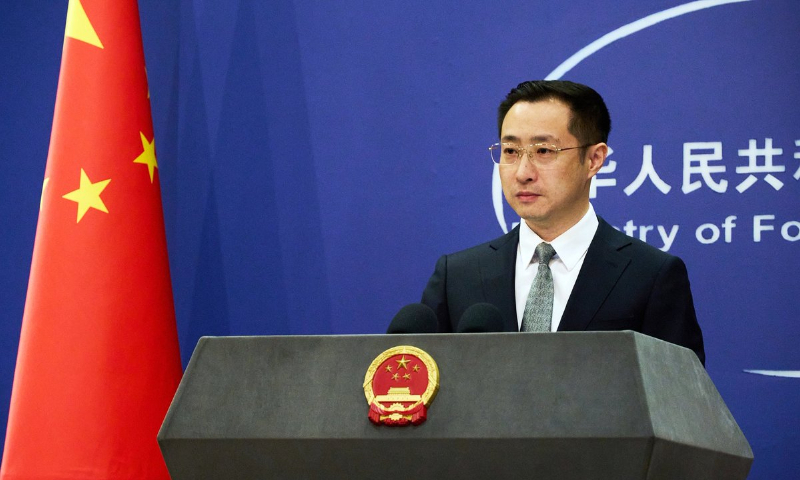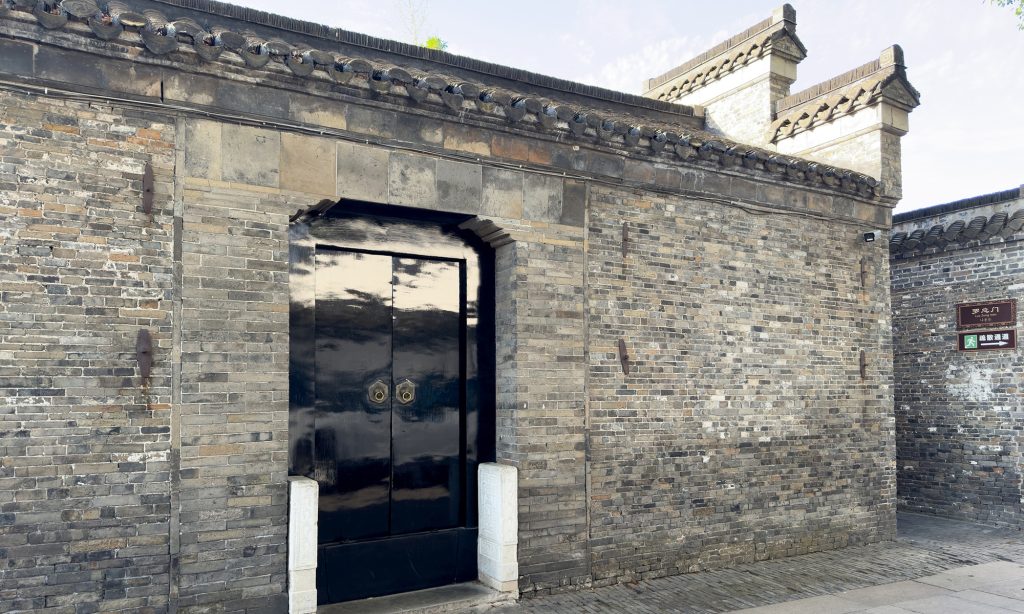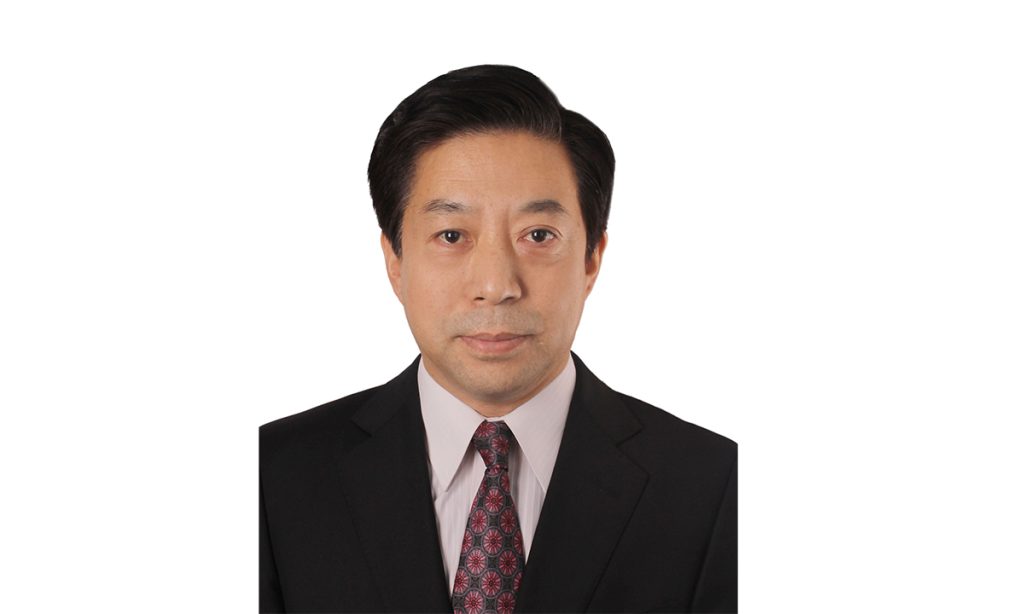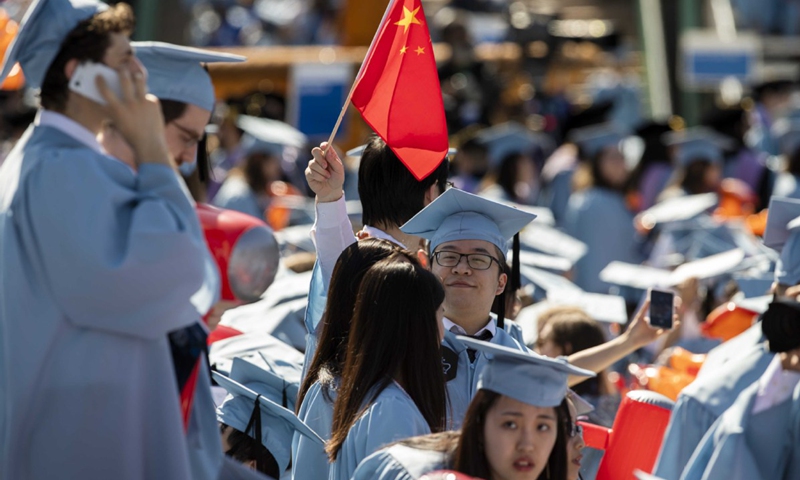Xi holds talks with Malaysian PM
Xi holds talks with Malaysian PM
Xi holds talks with Malaysian PM

Regarding what countermeasures China will take in response to the tariffs imposed by the US, whether it is true that China wants to make a deal as claimed by US president Donald Trump, and under what circumstances China will not impose countermeasures against the US, Chinese foreign ministry spokesperson Lin Jian told a press conference on Wednesday that the US side is still wantonly imposing tariffs on China and relentlessly exerting maximum pressure. China firmly opposes and will never accept such overbearing and bullying practices.
If the US side truly wants to resolve issues through dialogue and negotiation, it should show an attitude of equality, respect, and mutual benefit. If the US side disregards the interests of the two countries and the international community and insists on waging a tariff war and a trade war, China's response will continue to the end, Lin said.

A visiting event was held Thursday at the former residence of Jiang Zemin, the late Chinese leader, in Yangzhou, East China's Jiangsu Province. The event was attended by Jiang's relatives, former staff, and representatives of local officials and residents of Jiangsu Province. Jiang's former residence has recently been opened to the public, according to the Xinhua News Agency.
Located at No. 16 Dongquanmen, Dongguan Street of Yangzhou, the former residence consists of two courtyard complexes: the east and west sections. The west section was where Jiang lived with his family during his childhood and teenage years (1929-1940) as a tenant. The east courtyard now houses the main exhibition, which focuses on Jiang's life and is divided into three themes: "A great and glorious life," "A patriotic intellectual family," and "Yangzhou the forever hometown," Xinhua said.
The residence is open to the public by time-slot appointments from Tuesday to Sunday.
Jiang passed away due to leukemia and multiple organ failure in Shanghai at 12:13 pm on November 30, 2022, at the age of 96, Xinhua reported.
Following the organization of its army, navy, air, and rocket forces to conduct joint exercises around Taiwan island on Tuesday, the Chinese People's Liberation Army (PLA) organized the "Strait Thunder-2025A" exercises in the central and southern areas of the Taiwan Straits on Wednesday.
An expert told the Global Times that this move demonstrates the PLA's tighter siege on "Taiwan independence" secessionist forces through more stringent measures with thunderous actions.
On Wednesday, the PLA Eastern Theater Command conducted military exercises code-named "Strait Thunder-2025A" in the middle and southern areas of the Taiwan Straits, according to Senior Colonel Shi Yi, spokesperson of the Eastern Theater Command.
The exercises focus on subjects of identification and verification, warning and expulsion, and interception and detention so as to test the troops' capabilities of area regulation and control, joint blockade and control, and precision strikes on key targets, Shi said.
Zhang Chi, a professor at the National Defense University, told Global Times that Wednesday's PLA exercises in the Taiwan Straits are codenamed "Strait Thunder-2025A," which shows that the PLA has rich options and various measures in deterring "Taiwan independence" secessionist forces.
For the Lai Ching-te authorities and "Taiwan independence" secessionist forces, the PLA is always on a high level of combat readiness, like a sharp sword or a heavy hammer over their heads, Zhang said.
"We are tightening the siege and chains on the 'Taiwan independence' secessionist forces through stricter measures with thunderous actions. It means that the more 'Taiwan independence' secessionist forces provoke, the stronger the punishment will be put on them," Zhang said.
Fu Zhengnan, an expert at the PLA’s Academy of Military Science, told the Global Times on Wednesday that the “Strait Thunder-2025A” exercises formed a situation in which the island of Taiwan is surrounded from two sides, as “independence” forces are pinned down and deterred.
From the “Joint Sword” series drills in 2024 to the latest “Strait Thunder” operation, the change in code name means the PLA’s military measures to deter “independence” are becoming more and more comprehensive, according to Fu.
Fu said that during the exercises, the PLA Eastern Theater Command had warships and warplane formations advancing simultaneously, locking down the island from two directions, and conducted simulated strikes on key “Taiwan independence” targets. Under the support of a strong reconnaissance and early warning system, the PLA quickly seized the comprehensive control over the battlefield through aerial interception, sea assault and land strikes, forming a psychological deterrent on the “Taiwan independence” forces.
Through routine combat patrols and pressuring, the PLA’s capabilities of joint operations in deterring “Taiwan independence” have significantly increased. If the Lai Ching-te authorities dare to touch the red line or the bottom line, the PLA can crush “Taiwan independence” forces with thunderous strikes, Fu said.

China Welfare Lottery warned against scams claiming AI can predict winning lottery numbers, and explained the mechanics of lottery draws.
In a statement on its official WeChat account on Sunday, China Welfare Lottery warned that scammers have been promoting paid “prediction services” under the false pretense of “100 percent winning rate through AI predicting technology,” leading many to be duped, reminding the lottery players to stay vigilant in the face of such temptations.
The lottery is a game of probability, the statement emphasized. Take the shuangseqiu (double color ball), as an example, according to the rules, players select six numbers from 1 to 33 among the red balls and one number from 1 to 16 among the blue balls to form a single entry. There are over 17.72 million possible combinations, and each combination has the same probability of winning. Every draw is a standalone random event, with no underlying pattern.
Based on statistics, machine learning, and data mining, AI prediction infer the likelihood of future events or outcomes by analyzing patterns and trends in historical data. However, lottery draws are completely random and independent. Past results have no bearing on future outcomes.
Even complex AI analysis of past draws cannot predict future winning numbers, as each draw is an independent event unaffected by previous results, the statement said, noting that fraudsters claiming that AI can predict lottery numbers are simply exploiting people’s desire to win, fabricating a seemingly “scientific” scam.
The lottery authority urged players to stay rational while seeking luck, to stay vigilant and do not be misled by false promises and temptations.
Players were also advised to raise their awareness of scams and improve their ability to spot fraud, and to avoid falling victim to deception, according to the WeChat account article.

Editor's note:
This year marks the 50th anniversary of the establishment of diplomatic relations between Thailand and China. In an exclusive interview with the Global Times, Chinese Ambassador to Thailand Han Zhiqiang said that the two countries are emphasizing the alignment of development strategies, deepening cooperation in emerging economic and technological fields, and making preparations for the historic state visit of the Thailand's King to China in the second half of this year.
Recently, the telecom fraud along the Thai-Myanmar border has drawn much attention. As China, Myanmar and Thailand have stepped up their crackdown on telecom fraud compounds, those compounds in Myanmar have successively released about 7,000 people from more than 20 countries.
Thai foreign ministry spokesperson Nikorndej Balankura told reporters that the government plans to repatriate 1,500 people per week, or 300 each weekday, with "regular repatriations of Chinese nationals every Wednesday, Thursday and Friday," according to the AFP.
Han said China appreciates Thailand's effort for taking strong measures to dismantle telecom fraud gangs and safeguard the lives and property of citizens of China and other countries. China will continue to deepen law enforcement cooperation with relevant countries, including Thailand, step up efforts to combat cross-border criminal activities such as telecom fraud, online gambling, and human trafficking, fully assist in the investigation, search, rescue and release of missing and trapped people, and effectively safeguard the lives, property and legitimate rights and interests of the people.
GT: In February this year, Prime Minister of Thailand Paetongtarn Shinawatra paid her first official visit to China after assuming office. What do you think is the significance of this visit? What are your expectations for the future of China-Thailand relations?
Han: From February 5th to 8th, the Thailand Prime Minister paid her first official visit to China and attended the opening ceremony of the 9th Asian Winter Games in Harbin. The visit yielded fruitful results. This visit took place at the beginning of the 50th anniversary of the establishment of diplomatic relations between China and Thailand and the "golden jubilee" of their friendship. The leaders of the two countries had in-depth exchanges of views on bilateral relations as well as regional and international issues, and reached important consensuses.
During Paetongtarn's visit, the leaders of the two countries reaffirmed their mutual support on issues concerning each other's core interests and major concerns.
China supports Thailand in following a development path that suits its national conditions, and Thailand reaffirmed its firm commitment to the one-China principle and its non-support for "Taiwan independence." The two sides emphasized the need to strengthen the alignment of development strategies, deepen cooperation in emerging economic and technological fields, and prepare for the historic state visit of the Thailand's King to China in the second half of this year.
Thai PM's visit has further strengthened the political mutual trust between China and Thailand and further consolidated the foundation for the two countries to jointly build a community with a shared future.
Paetongtarn's visit has also injected strong impetus into practical cooperation. China has been Thailand's largest trading partner, its largest export market for agricultural products, and also its main source of foreign investment and foreign tourists for 12 consecutive years.
Cooperation between the two countries has been booming. During the visit, the leaders of the two countries witnessed the signing of several cooperation documents, and discussed strengthening connectivity under the framework of the Belt and Road Initiative, deepening cooperation in the industrial and supply chain, enhancing law enforcement security and judicial cooperation, as well as expanding cooperation in emerging fields such as the digital economy and new energy vehicles.
It has promoted a new upsurge in people-to-people and cultural exchanges. The Sacred Buddha Relic, a revered symbol of Buddhist devotion housed at Beijing's Lingguang Temple, was temporarily enshrined in Thailand from December 5, 2024, to February 14, 2025, which received a warm response from all sectors of Thai society.
During the Spring Festival, Thailand's King Vajiralongkorn and Queen Suthida Bajrasudhabimalalakshana held a Spring Festival ancestor worship ceremony. Princess Maha Chakri Sirindhorn of Thailand attended the celebration activities in Bangkok's Chinatown, and Prime Minister Paetongtarn issued a Chinese New Year greeting message using AI.
During Paetongtarn's visit, the two sides unanimously agreed to explore international cooperation on giant pandas, deepen and expand exchanges and cooperation in various fields such as culture, tourism, education, and sports, and continuously promote mutual understanding and friendship between the people of the two countries, so that the China-Thailand friendship can be passed down from generation to generation.
Against the backdrop of the accelerated evolution of the profound changes unseen in a century, the sluggish global economic recovery, and the rising trends of protectionism and unilateralism, the two countries are faced with common external challenges and share common interests and similar views on many international and regional issues.
China and Thailand need to strengthen coordination in safeguarding international fairness and justice, upholding the multilateral trading system, and promoting the improvement of global economic governance.
During Thai PM's visit, the Thailand side clearly expressed its support for China's initiatives, including jointly building the Belt and Road Initiative, the Global Development Initiative, the Global Security Initiative, and the Global Civilization Initiative.
The two sides agreed to strengthen strategic communication under multilateral platforms such as the Lancang-Mekong Cooperation, the Asia-Pacific Economic Cooperation (APEC), the BRICS countries, and the Asian Cooperation Dialogue. The friendly cooperation between China and Thailand will help the two countries jointly address global risks and challenges, and make positive contributions to regional and world peace, stability and prosperity.
Looking ahead, we are confident in the bright prospects of China and Thailand jointly building a community with a shared future.
First, we will maintain close high-level exchanges and dialogues, deepen strategic communication, jointly address external risks and challenges, and continuously advance the building of a China-Thailand community with a shared future in a deeper and more practical manner.
Second, we will implement the important consensuses reached by the leaders of the two countries, deepen cooperation in connectivity, economic and trade investment, green development, the digital economy, and other fields, boost the modernization process of our respective countries, promote people-to-people and cultural exchanges, and create a more substantial and significant next "golden jubilee" of China-Thailand friendship.
Third, we will strengthen regional multilateral communication, deepen cooperation under the Lancang-Mekong Cooperation framework, China-ASEAN cooperation, and cooperation within the framework of the United Nations, contribute to maintaining regional peace and stability, promote the pooling of strength among countries in the "Global South," and work toward building a more just and reasonable global governance system.
GT: Thailand's cabinet recently approved the second phase of the high-speed rail project that will connect the Southeast Asian country with China through Laos, with completion expected in 2030. The China-Thailand Railway is an important cooperation project under the Belt and Road Initiative between the two countries. Could you share this project's latest progress? And what impact will this project have on the economies of the two countries?
Han: During Paetongtarn's visit, leaders of the two countries reached important consensuses on the proper implementation of flagship projects such as the China-Thailand Railway and on promoting the early achievement of more results in the concept of the connected development among China, Laos and Thailand.
The Thai side stated that it will accelerate the construction of the first phase of the China-Thailand Railway and will launch the second phase within this year. China highly commended this and will provide assistance.
The China-Thailand Railway is not only a new efficient and safe land passage for the flow of people and goods between China and Thailand, but also an important part of the major transportation artery in the Indo-China Peninsula.
In the future, the China-Thailand Railway will be further extended southward and connected with the railway networks of Malaysia and Singapore, which can further promote the connectivity between China and Southeast Asian countries.
This "trans-Asian Railway" can also be connected to Europe via the China-Europe freight trains, and its prospects are indeed limitless. The China-Laos Railway has been operating smoothly for more than three years. And the completion of the China-Thailand Railway will contribute to the realization of the goal of connected development among China, Laos and Thailand, and bring benefits to the people of the three countries.
GT: Since the implementation of the visa-exemption agreement between China and Thailand on March 1, 2024, nearly a year has passed. How do you evaluate the role of the visa-exemption agreement in promoting personnel exchanges between the two sides? What potential do you think there is for further cooperation between the two countries in the cultural industry?
Han: Since the implementation of the visa exemption agreement between China and Thailand, the people of the two countries have been traveling to each other's countries, and the people-to-people and cultural exchanges between China and Thailand have reached a new high.
In 2024, the number of Chinese tourists visiting Thailand reached 6.733 million, accounting for 19 percent of the total number of foreign tourists in Thailand and ranking first. The number of Thai tourists traveling to China has increased rapidly. In 2024, it exceeded 1.1 million, nearly three times higher than that in 2023, far exceeding the level before the pandemic, and China has become one of the most popular overseas travel destinations for Thai tourists.
According to the forecasts of the tourism industry associations of China and Thailand, the number of Chinese tourists traveling to Thailand will further recover significantly in 2025, and the number of Thai tourists traveling to China will continue to rise.
In recent years, with the help of new carriers such as film and television dramas, games, online literature, and cultural and creative trendy play products, Chinese culture and development concepts have been attracting increasing attention and welcome from the Thai people, especially the younger generation, in a more fashionable, diverse, and open manner, thus becoming a new window for Thais to understand China.
At the same time, China and Thailand are important markets for each other's cultural products going global and for soft power economic cooperation. The two countries can further strengthen the alignment of development strategies in the cultural and creative industries, and enhance exchanges in aspects such as policy exchanges, talent cultivation, digital technology empowerment, and the improvement of the international competitiveness of cultural products.
The cooperation in the cultural industries between China and Thailand is not only an important force to promote people-to-people and cultural exchanges, but also a new economic growth point for both sides.
GT: Recently, the telecom fraud on the Thailand-Myanmar border has drawn close attention. How do you evaluate the recent measures cracking down on telecom fraud taken by Thailand? Could you introduce the latest progress of the cooperation between China and Thailand in combating telecom fraud and other transnational criminal activities?
Han: Recently, in response to the continuous occurrence of vicious online gambling and telecom fraud cases on the Thailand-Myanmar border, China, Thailand, and Myanmar have jointly launched a concentrated crackdown operation.
Many telecom fraud compounds have been eradicated, and a large number of suspects have been arrested. More than 2,000 Chinese nationality criminal suspects have been repatriated to China. China has expressed its appreciation for the strong measures taken by Thailand to destroy the telecom fraud gangs and safeguard the lives and property of Chinese and other countries' citizens.
China will continue to deepen law enforcement cooperation with relevant countries, including Thailand, step up efforts to combat cross-border criminal activities such as telecom fraud, online gambling, and human trafficking.
China will assist in the investigation, search, rescue and release of missing and trapped people, effectively safeguard the lives, property and legitimate rights and interests of the people, and jointly maintain regional peace. At the same time, we also require Chinese citizens overseas to strictly abide by local laws and regulations and refrain from engaging in criminal activities.

New Zealand media hyped that China plans to "construct its second base on the New Zealand side of Antarctica." A Chinese expert highlighted China's stance of being open to cooperation in advancing exploration and at the same time warned against voices politicizing scientific research.
China has now submitted a draft environmental evaluation to the Secretariat of the Antarctic Treaty for the construction and operation of a new summer research station at Marie Byrd Land, the New Zealand Herald reported on Friday.
The submission was confirmed by New Zealand's Ministry of Foreign Affairs and Trade, according to the report.
According to the draft environmental evaluation dated February, Marie Byrd Land is located in West Antarctica, nestled between the Ross Sea and the Amundsen Sea, to the south of the Getz Ice Shelf.
The proposed new summer station is positioned as one of the key international platforms supporting multi-factor observation and research of the atmosphere, glaciers and ice shelves, and oceans in West Antarctica under the backdrop of global climate change, the elevation report says.
It aims to provide more effective long-term scientific data support for studies on the stability of the West Antarctic ice sheet and its key influencing factors, according to the report.
The New Zealand Herald said in its Friday report that it acknowledged the Antarctic Treaty system allows countries to establish research facilities in Antarctica, but in recent years there has been growing concern that these facilities could have "dual use," the report said, citing a US Defence Department report from 2022.
Chen Hong, director of the Australian Studies Center of East China Normal University, told the Global Times that the US is attempting to politicize Antarctic scientific research, using non-existent "political motives" and "military motives" to smear China's legitimate activities.
Regarding Antarctic research, China's stance has always been clear: it is willing to cooperate with international partners to advance the exploration, utilization, and protection of Antarctica. In contrast, the US has long viewed Antarctica as a strategic base and seeks to conduct research there that can be directly applied to military purposes, Chen said.
China collaborates with many parties to the Antarctic Treaty, including Australia, Argentina, and Chile. New Zealand, as one of the gateways to Antarctica, engages in international cooperation with China under the Antarctic Treaty system, Chen said. He added that China has never linked its scientific activities in Antarctica to politics, as evidenced by the Qinling Station, which is solely dedicated to scientific research.
Previously, Chinese ambassador to Australia Xiao Qian told Australian media ABC that China wanted to contribute to global efforts to address climate change. "We are open, we are transparent, we are ready to cooperate with Australia and many other partners of the Antarctic Treaty to make further efforts in that direction," he said.
Cooperation surrounding Antarctica was one of the topics that was discussed when Deputy Prime Minister and Foreign Minister of New Zealand Winston Peters visited Beijing in February.
At present, China has established five research stations in the Antarctic, namely the Great Wall Station, Zhongshan Station, Kunlun Station, Taishan Station and Qinling Station.
China is conducting its 41st Antarctic expedition, which set sail from the southern Chinese port city of Guangzhou on November 1, 2024. The mission is set to last nearly seven months, with a return scheduled for May 2025.

A group of US House Republicans have put forward legislation seeking to prevent Chinese students from studying in American schools, citing so-called national security concerns, according to AP News. The move has then elicited criticism from some international education organizations and Democrats, with a Chinese expert noting that the motivation behind the legislation appears to be political posturing, an attempt to serve one's own political agenda.
US Congressman Riley Moore introduced legislation to halt the issuance of student visas to Chinese nationals, and five House lawmakers joined Moore in co-sponsoring the legislation, according to a press release published on Friday.
Moore claimed in a statement that the US "invited" China to spy on the US' military, steal intellectual property, and threaten national security of the country. He added, "It's time we turn off the spigot and immediately ban all student visas going to Chinese nationals."
While the measure being unlikely to pass, the AP noted, the proposed legislation has drawn a backlash from educational organizations. In response to the bill, the Asian American Scholar Forum (AASF) said in a post on X that such a move would harm the talent pipeline of Asian American scientists, scholars and researchers, undermining US leadership in science and innovation.
"No policy should target individuals solely on the basis of their national origin," said Fanta Aw, executive director and CEO of NAFSA, an association of international educators, according to a statement cited by the AP.
Aw added that making international students — the most vetted and tracked nonimmigrants in the US — a scapegoat for xenophobic and anti-Chinese sentiment is misguided and antithetical to the US national interest, according to AP.
Unlike most previous restrictions on Chinese students, Moore's proposal applies to all Chinese students, regardless of their field or level of study, the South China Morning Post (SCMP) reported. It targets the three main types of US study visas - F, J and M visas - which are used, respectively, for studying at US universities and English language institutes; exchanges at the high school and university level; and non-academic and vocational training or study.
Some Democrats also questioned the bill, according to SCMP. Democratic Representative Grace Meng of New York, who chairs the Congressional Asian Pacific American Caucus, said that "cultural exchange through university program has made our economy stronger and more competitive on the global stage."
A PhD student from China at the University of Oklahoma, Chen Li (alias), told the Global Times on Sunday that many Chinese students that she knows are concerned that such legislation could lead to more stringent visa policies, adversely affecting their academic pursuits and daily lives.
Chen also highlighted apprehensions that the proposal could exacerbate biases against Chinese students, potentially hindering academic exchanges between China and the US. She added that some students may consider alternative study destinations or revalue their career plans if the legislation passes.
Liu Wei (alias), a Beijing-based applicant for US graduate programs who is currently awaiting admission offers, voiced concerns about potential changes in US policies that could affect Chinese students' entry and visa status. However, she noted that she believes the legislation is unlikely to pass. She added that she is also considering offers from other countries as alternatives.
The primary motivation behind the legislation appears to be political posturing, or rather, an attempt to serve one's own political agenda, Yang Xiyu, a senior research fellow at the China Institute of International Studies, told the Global Times.
The matter itself reflects that, despite the difficulty of enacting the legislation, the act of using the legislative process to advance US political interests is essentially adding fuel to the fire and further politicizing the legislative process to serve as way to smear China, Yang added.
Citing a series of US visa restrictions, Yang pointed out that the US' increasingly closed-off attitude towards China reflects its growing lack of confidence, marking a shift from overconfidence to strategic anxiety as China's development narrows the gap in national strengths.
The following are the schedules for the third session of the 14th National People's Congress (NPC) and the third session of the 14th National Committee of the Chinese People's Political Consultative Conference (CPPCC) on Thursday.
In the morning, NPC deputies will deliberate the government work report in groups.
In the afternoon, they will examine reports and drafts on budgets and economic and social development plans.
In the morning, CPPCC National Committee members will discuss the government work report and deliberate the work report of their standing committee in groups.
In the afternoon, they will continue to discuss the government work report and deliberate the work report of their standing committee, and discuss reports on budgets and economic and social development plans, as well as a draft amendment to the Law on Deputies to the National People's Congress and to the Local People's Congresses at Various Levels.
Keynote Speech by H.E. Wang Yi
At the 61st Munich Security Conference
Conversation with China
Munich, February 14, 2025
Your Excellency Chairman Christoph Heusgen,
Dear Friends,
Colleagues,
The world we live in is an increasing mix of turbulence and transformation. Many people are asking the same question: Where is it headed? If I may borrow the theme of this year's Munich Security Report, it is headed toward multipolarization. When the United Nations was founded 80 years ago, it had only 51 member states; today, 193 countries ride in the same big boat. A multipolar world is not only a historical inevitability; it is also becoming a reality.
Will multipolarity bring chaos, conflict and confrontation? Does it mean domination by major countries and the strong bullying the weak? China's answer is, we should work for an equal and orderly multipolar world. This is another major proposition put forward by President Xi Jinping, and it represents our sincere expectation for a multipolar world. China will surely be a factor of certainty in this multipolar system, and strive to be a steadfast constructive force in a changing world.
Here, I want to make four points.
First, it is important to advocate equal treatment. Rivalry between big powers had brought disaster to humanity, as evidenced by the lessons of the two world wars in the not-so-distant past. Whether it is the colonial system or the core-periphery structure, unequal orders are bound to meet their demise. Independence and autonomy is sought across the world, and greater democracy in international relations is unstoppable. Equal rights, equal opportunities and equal rules should become the basic principles of a multipolar world.
It is in this principle that China advocates equality among all countries regardless of size, and calls for increasing the representation and say of developing countries in the international system. This will not lead to "Westlessness," but will deliver more positive-sum results to the world. The Munich Security Conference has invited more participants from Global South countries in recent years. This is a wise thing to do. Every country should have their voice heard. Every country should be able to find their place and play their role in a multipolar paradigm.
Second, it is important to respect international rule of law. As an old Chinese saying goes, circles and squares cannot be drawn without compasses and rulers, which means nothing can be accomplished without following norms and standards. The purposes and principles of the U.N. Charter provide fundamental guidance for handling international relations. They are also an important cornerstone of a multipolar world. The world today is witnessing incessant chaos and confusion, and one important reason is that some countries believe might makes right and have opened a Pandora's box marked the law of the jungle. In reality, all countries, regardless of size or strength, are stakeholders in international rule of law. The multipolar paradigm must not be a state of disarray. Without norms and standards, one may be at the table yesterday but end up on the menu tomorrow. Major countries must take the lead in honoring their words and upholding rule of law, and must not say one thing but do another, or engage in zero-sum game.
It is based on the above points of view that China resolutely upholds the authority of international rule of law, and actively fulfills its international responsibilities and obligations. It is a member of almost all universal intergovernmental organizations and a party to over 600 international conventions. It never practices exceptionalism, still less cherrypicking. It is providing the greatest certainty in this uncertain world. I wish to emphasize that there should be no double standards in observing international law. Respect for all countries' sovereignty and territorial integrity should mean support for China's complete reunification.
Third, it is important to practice multilateralism. In the face of emerging global challenges, no country can stay unaffected, and the "we first" approach in international relations only leads to a lose-lose result. The U.N. is at the core of practicing multilateralism and advancing global governance. This edifice has shielded all countries from wind and rain for nearly 80 years, and is all the more needed in the multipolar world of the future. We should cement its foundation, rather than destroy its pillars. We should take up our responsibilities on governing global issues, rather than seek self-interests only. We should tackle common challenges in solidarity, rather than resort to bloc confrontation.
It is from this understanding that China upholds true multilateralism and advocates the vision on global governance featuring extensive consultation and joint contribution for shared benefit. We have firmly upheld the authority and stature of the U.N., and contributed to more than 20 percent of the U.N. regular budget. We have acted earnestly on the Paris Agreement on climate change, and built the world's largest clean power generation system. We have also proposed and delivered on the Global Development Initiative, the Global Security Initiative and the Global Civilization Initiative, providing public goods for improving global governance.
Fourth, it is important to pursue openness and mutual benefit. Development holds the key to addressing various problems. The multipolar world should be one where all countries develop together. Protectionism offers no way out, and arbitrary tariffs produce no winners. Decoupling deprives one of opportunities, and a "small yard with high fences" only ends up constraining oneself. It is important to pursue open cooperation, and support an equal and orderly multipolar world with a universally beneficial and inclusive economic globalization.
It is for this goal that China stays committed to sharing development opportunities with all countries. An Australian scholar called China an "enabler," which I find very fitting. With a five-percent GDP growth last year, China contributed to nearly 30 percent of the world economic growth. It has served as an important engine for global economic growth, and shared with the world the benefit of its supersized market. China is willing to synergize high-quality Belt and Road cooperation with the European Union's Global Gateway strategy, so as to empower each other and empower the entire world.
Friends,
China has always seen in Europe an important pole in the multipolar world. The two sides are partners, not rivals. This year marks the 50th anniversary of China-EU diplomatic relations. Taking this opportunity, China is willing to work with the European side to deepen strategic communication and mutually beneficial cooperation, and steer the world to a bright future of peace, security, prosperity and progress.